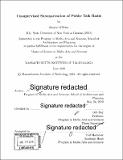Unsupervised summarization of public talk radio
Author(s)
O'Brien, Shayne,S.M.Massachusetts Institute of Technology.
Download1136615205-MIT.pdf (9.212Mb)
Other Contributors
Program in Media Arts and Sciences (Massachusetts Institute of Technology)
Advisor
Deb Roy.
Terms of use
Metadata
Show full item recordAbstract
Talk radio exerts significant influence on the political and social dynamics of the United States, but labor-intensive data collection and curation processes have prevented previous works from analyzing its content at scale. Over the past year, the Laboratory for Social Machines and Cortico have created an ingest system to record and automatically transcribe audio from more than 150 public talk radio stations across the country. Using the outputs from this ingest, I introduce "hierarchical compression" for neural unsupervised summarization of spoken opinion in conversational dialogue. By relying on an unsupervised framework that obviates the need for labeled data, the summarization task becomes largely agnostic to human input beyond necessary decisions regarding model architecture, input data, and output length. Trained models are thus able to automatically identify and summarize opinion in a dynamic fashion, which is noted in relevant literature as one of the most significant obstacles to fully unlocking talk radio as a data source for linguistic, ethnographic, and political analysis. To evaluate model performance, I create a novel spoken opinion summarization dataset consisting of compressed versions of "representative," opinion-containing utterances extracted from a hand-curated and crowd-source-annotated dataset of 275 snippets. I use this evaluation dataset to show that my model quantitatively outperforms strong rule- and graph-based unsupervised baselines on ROUGE and METEOR while qualitatively demonstrating fluency and information retention according to human judges. Additional analyses of model outputs show that many improvements are still yet to be made to this model, thus laying the ground for its use in important future work such as characterizing the linguistic structure of spoken opinion "in the wild."
Description
Thesis: S.M., Massachusetts Institute of Technology, School of Architecture and Planning, Program in Media Arts and Sciences, 2019 Cataloged from PDF version of thesis. Includes bibliographical references (pages 111-118).
Date issued
2019Department
Program in Media Arts and Sciences (Massachusetts Institute of Technology)Publisher
Massachusetts Institute of Technology
Keywords
Program in Media Arts and Sciences